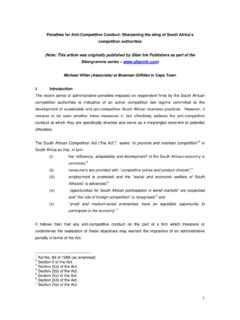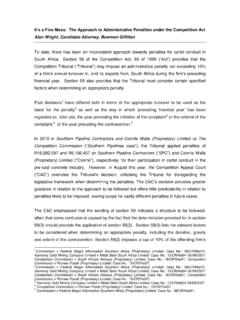Transcription of A summary of some cases on HIV/AIDS - SAFLII Home
1 case NOTE a summary of some cases on HIV/AIDS SAM RUGEGE Associate Professor of Law, University of the Western Cape Hoffmann v south african Airways 2000 (11) BCLR 1211 (CC); 2001 (1) SA (CC) This case is about the right of persons living with HIV/AIDS not to be discriminated against when applying for employment. The case is par-ticularly important because of the high incidence of HIV/AIDS on the african continent. It is reported that sub-Saharan Africa accounts for over 70% of the world-wide incidence of HIV/AIDS .
2 With the potential prob-lems of dealing with workers living with HIV/AIDS in terms of chronic illness resulting in absenteeism and low productivity, it is not surprising that employers should be reluctant to employ HIV-positive applicants and tend to exclude such applicants through pre-employment testing for HlV/AIDS. This case , however, emphasises that access to employment for HIV-positive persons is a matter of human rights, in particular the right not to be discriminated against unfairly and the right to human dignity.
3 It should be instructive for other jurisdictions in Africa and elsewhere. Hoffmann applied for a position with south african Airways (SAA) as a cabin attendant. He was one of 173 applicants. He successfully went through a four-stage selection process and found himself among 12 appli-cants found suitable for employment. The decision on suitability was, however, subject to a pre-employment medical examination, including a blood test for HIV/AIDS . The medical examination found him fit and therefore suitable for employment.
4 However, the blood test indicated that Hoffmann was HlV-positive. The medical report was then altered to say that he was HI V-positive and therefore 'unsuitable' for employment. He was informed that he could not be employed as a cabin attendant as he was HIV-positive. Hoffmann challenged the decision not to employ him in the High Court' on the ground that the refusal was unconstitutional as it constituted unfair discrimination and infringed his rights to equality, human dignity and fair labour practices] He sought an order directing SAA to employ him as a I UNAIDS 2000: 6.
5 2 Hoffmann v south african Airways 2000 (2) 628 (W) 3 Contrary to ss 9. 10. and 23 of the Constitution of the Republic of south Africa Act 108 of 1996. respectively. 237 Reproduced by Sabinet Gateway under licence granted by the Publisher (dated 2009).LAW. DEMOCRACY & DEVELOPMENT flight attendant. SAA defended its decision on medical, safety and opera-tional grounds. It claimed that its flight crew had to be fit for world-wide duty and had to be vaccinated against yellow fever as they may be re-quired to fly in yellow-fever endemic countries.
6 It argued that HIV-positive persons may react negatively to the vaccination and therefore may not be vaccinated. Without such vaccination, however, they run the risk of contracting yellow fever and spreading it to fellow crew and to passen-gers. HIV-positive persons would also be prone to contracting opportunis-tic diseases such as tuberculosis and chronic diarrhoea and could spread them to other flight crew and passengers. Moreover, flight attendants suffering from opportunistic diseases would not perform their duties properly, especially in emergenCies.
7 SAA also offered an economic reason for exclusion. The life expectancy of HIV-positive persons was toO short to justify the costs of training SAA further justified its action on the basis that other major airlines had similar employment practices. The High Court agreed with SAA's arguments and dismissed the appli-cation. It held that the exclusion was based on "medical. safety and operational grounds" and was "aimed at achieving a worthy and impor-tant societal goal". It further held that "it is an inherent requirement for a flight attendant, at least for the moment.
8 To be HIV-negative." The High Court concluded that the practice of denying employment to HIV-positive applicants did not amount to unfair discrimination. Hoffmann appealed to the Constitutional Court. The court found medi-cal evidence, including that tendered by SAA's expert, to be at variance with SAA's claim that Hoffmann would be a medical and safety risk. The evidence showed that only HIV-positive persons whose immune system had deteriorated to the immunosuppressed stage and whose CD4 + count" had dropped to below 350 per microlitre of blood would not be safely vaccinated against yellow fever.
9 Further, HIV-positive persons who had not reached that stage were not susceptible to secondary infections. The evidence also showed that modern medical treatment dramatically altered the progression of the HIV infection and that the treatment was capable of completely suppressing the replication of the virus and the person's immune system could recover. At a meeting of a number of experts, including the SAA expert, it was agreed that "with the advent of the [HAART] treatment, individuals are capable of living normal lives and they can perform any employment tasks for which they are otherwise qualified".
10 ' The medical experts concluded: "on medical grounds alone exclusion of an HlV-positive individual from employment solely on the basis of HIV positivity cannot be justified."P 4 Ir was averred rhat the cosr of training a night anendant was R30 000 (approximately US $4000 at the time of the action). SAA would have expected at least 10 years' service from a flight attendant after training. 5 Para 28 of the High Court judgment. 6 CD4 + lymphocytes are white blood cells. which are destroyed by the HI virus. 7 Quoted in para 14 of the Constitutional Court judgment.



















